 A Dark and Drowning Tide by Allison Saft
A Dark and Drowning Tide by Allison Saft Format: eARC
Source: supplied by publisher via NetGalley
Formats available: paperback, ebook, audiobook
Genres: dark academia, epic fantasy, fantasy mystery, fantasy romance, romantasy, gaslamp
Pages: 384
Published by Del Rey on September 17, 2024
Purchasing Info: Author's Website, Publisher's Website, Amazon, Barnes & Noble, Kobo, Bookshop.org, Better World Books
Goodreads
A sharp-tongued folklorist must pair up with her academic rival to solve their mentor's murder in this lush and enthralling sapphic fantasy romance from the New York Times bestselling author of A Far Wilder Magic.
Lorelei Kaskel, a folklorist with a quick temper and an even quicker wit, is on an expedition with six eccentric nobles in search of a fabled spring. The magical spring promises untold power, which the king wants to harness to secure his reign of the embattled country of Brunnestaad. Lorelei is determined to use this opportunity to prove herself and make her wildest, most impossible dream come to become a naturalist, able to travel freely to lands she’s only ever read about.
The expedition gets off to a harrowing start when its leader—Lorelei’s beloved mentor—is murdered in her quarters aboard their ship. The suspects are her five remaining expedition mates, each with their own motive. The only person Lorelei knows must be innocent is her longtime academic rival, the insufferably gallant and maddeningly beautiful Sylvia von Wolff. Now in charge of the expedition, Lorelei must find the spring before the murderer strikes again—and a coup begins in earnest.
But there are other dangers lurking in the forests that rearrange themselves at night, rivers with slumbering dragons waiting beneath the water, and shapeshifting beasts out for blood.
As Lorelei and Sylvia grudgingly work together to uncover the truth—and resist their growing feelings for one another—they discover that their professor had secrets of her own. Secrets that make Lorelei question whether justice is worth pursuing, or if this kingdom is worth saving at all.
My Review:
While it’s true that “academic politics are so vicious because the stakes are so small”, that insight is merely the start of this epic sapphic romantasy. Lorelei Kaskel and Sylvia von Wolff have been rival proteges of Professor Ingrid Ziegler for years, vying for their mentor’s time, attention and praise even as they follow slightly different academic paths to the same goal.
A goal that is about to be realized, only for that realization to fall into another familiar saying, that “having a thing is not so pleasurable as wanting”. Both women should have been careful what they wished for, because this particular “ring” comes with a very large and deadly curse.
The kingdom of Brunnestaad has just, seriously just, extremely recently and still somewhat resentfully, been united under its young ruler into a slightly shaky and somewhat fractious union of formerly independent kingdoms that, for the most part, would much rather go back to being independent and all too frequently at war with one another.
King Wilhelm needs a project that will rally all those factions under his banner. Alternatively, he needs a common enemy to accomplish the same thing. A royally sponsored, scientific/magical expedition to find a legendary source of magic and power SHOULD do the trick – and make him unstoppable after all that power is, naturally and of course, delivered to him on a silver platter by the members of the expedition.
All of whom are his best friends, the aristocratic children he grew up with, who all banded together against their feuding, warring parents. He trusts them and he is counting on their personal loyalty even more than their oaths to his unsteady crown.
“Back in the days when wishes still held power”, this story’s lyrical equivalent of “once upon a time”, all of his friends would have been utterly loyal, all of the members of the expedition would have been completely trustworthy, and the fabled Ursprung would have been found easily and without delay and its power would have been granted to him immediately and its presence alone would have been more than enough to solve all of his kingdom’s problems without need for war or bloodshed.
But wishes no longer have such power – not even a king’s.
Howsomever, two members of the expedition are not even among the king’s trusted intimates. The expedition leader Ziegler, who Wilhelm has pretty much held hostage in the capital for years of planning – and her protegee Lorelei Kaskel, a prodigious and prickly scholar who Ziegler plucked from the ghetto her people have been forced to live in for centuries. Kaskel herself is is the ultimate outsider, her people are hated, feared and reviled at every turn, their status is the backbone of nearly every bit of the folklore that she studies, and no one ever lets Kaskel forget it.
In other words, Kaskel is a Jew – although her people are never quite called by that name – this world is in the equivalent of the Middle Ages in its pervasive anti-Semitism, and Kaskel is never allowed to forget that she is at the university on sufferance and is a ready scapegoat for anything that might go wrong.
Only it won’t just be Kaskel who will pay for her mistakes. Her friends, her family, her entire community can be put to the torch if she fails or falls. It’s happened before, and it will inevitably happen again.
When Ziegler is murdered on the very first evening of travel, all the responsibility and all the consequences fall hard on Kaskel’s shoulders. She knows the murderer was one of their company. She knows she’ll be executed if the expedition fails, and she knows that every single person has multiple motives for the crime and that they will all seek to undermine her authority and her decisions at every turn.
She has one hope – and it comes from a source that she isn’t sure she can trust with anything except the sure and certain knowledge that neither of them killed their mentor. Her only ally is her academic rival, Sylvia von Wolff. Together they will find both the source of magic AND the murderer.
All they have to do is stick together – a task that is both much easier and much, much harder than even their long-standing and bitter rivalry would ever have led them to expect.
Escape Rating A-: This book is a lot – and a lot of it is very, very good. Like staying up half the night to finish good. But there were just enough things that drove me crazy to keep it from tripping over the line from A- to A.
Which is going to require more than a bit of explanation.
Both what made this work, and what didn’t, was in the characters. On that one famous hand, we have Lorelei Kaskel and her rival turned frenemy and eventual lover, Sylvia von Wolff. We see the story from inside Kaskel’s head, and we get to see what makes her tick – as well as what ticks her off – from the opening of the story.
But the more we learn from her and of her, the deeper both she, and the story, get. It was clear to this reader that Kaskel’s Yevani people were this fantasy world’s equivalent of the Jews. It’s in the in-world history, in the treatment of her people at this point in world time, it’s in the pervasiveness of anti-Yevani (read as anti-Semitic) folklore. And the language they speak in the ghetto is definitely Yiddish.
In other words, these are my people and it was easy for me to see Kaskel’s perspective and even share it.
That she sees the ease with which Sylvia von Wolff, not merely an aristocrat but the descendant of actual kings, moves through the world, the way that opportunities are handed to Sylvia on a platter and seemingly all her transgressions are swept away, and that it all makes her downright angry is totally understandable. That she believes that everyone looks down on her all the time and that it makes her encase herself in ice as the only defense mechanism she has feels all too real, because they all DO look down on her and her ability to fight back is very much limited by her circumstances.
Which is exactly what makes the romance between Lorelei and Sylvia so much of an opposites attract, wrong side of the tracks affair and makes it so hard for Lorelei to believe is even possible. It has that darkly delicious air of the forbidden and taboo with actually being either of those things in any moral sense.
On that infamous other hand, the thing that made this story not quite hit that “A” mark was the other characters. The story is so focused on Lorelei’s and Sylvia’s dance of romance and hate that the other characters don’t get enough “air time” to be anything more than archetypes – and generally hateful ones at that.
This story is, among its many other parts, a fantasy mystery, and we don’t get enough of any of the other characters to even care whodunnit and why as long as we get to watch Lorelei and Sylvia play “come here go away” games.
At the end, the solution to the mystery felt a bit anticlimactic, while the solution to the political shenanigans didn’t have quite as much depth as it might have because we just don’t have enough outside of the romance.
So if you’re here for the sapphic romantasy aspects of the story – this is one that will keep you up half the night just to see if they manage to get past the obstacles in their way. If you’re here for either the mystery or the epic fantasy, you’ll still be glad to know whodunnit and why, but the romance is definitely the more satisfying side of the story.

 Lady Macbeth by
Lady Macbeth by 
 (If you’re wondering – as I was – it reminds me of
(If you’re wondering – as I was – it reminds me of  To Gaze Upon Wicked Gods (Gods Beyond the Skies, #1) by
To Gaze Upon Wicked Gods (Gods Beyond the Skies, #1) by 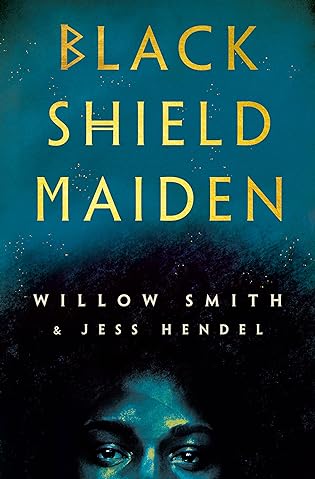 Black Shield Maiden by
Black Shield Maiden by  Escape Rating A-: I came to this book by an odd route. I watched a playthrough of
Escape Rating A-: I came to this book by an odd route. I watched a playthrough of 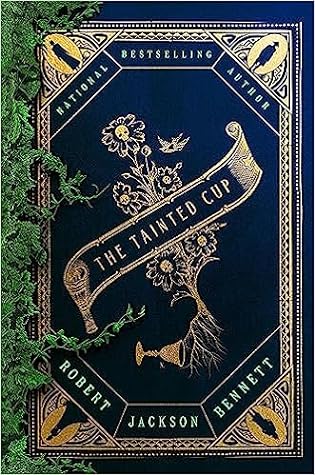 The Tainted Cup (Shadow of the Leviathan, #1) by
The Tainted Cup (Shadow of the Leviathan, #1) by 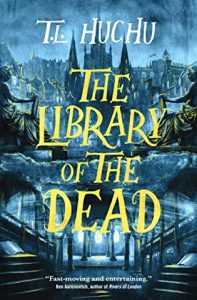 Escape Rating A+: There’s been a rise in science fiction mysteries in the last couple of years, with books like Mur Lafferty’s
Escape Rating A+: There’s been a rise in science fiction mysteries in the last couple of years, with books like Mur Lafferty’s 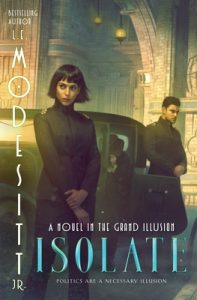 But the setting of The Tainted Cup, and the epically FUBAR political situation therein, is very much fantasy of both the grimdark and steampunk varieties. The world, with its mixture of science and magic and scientifically based magic is similar to the setting of L.E. Modesitt’s
But the setting of The Tainted Cup, and the epically FUBAR political situation therein, is very much fantasy of both the grimdark and steampunk varieties. The world, with its mixture of science and magic and scientifically based magic is similar to the setting of L.E. Modesitt’s 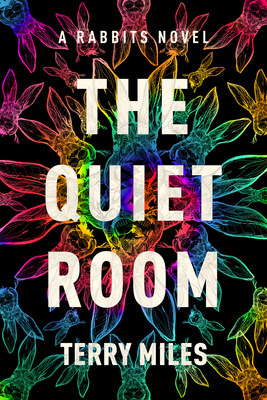 The Quiet Room (Rabbits, #2) by
The Quiet Room (Rabbits, #2) by 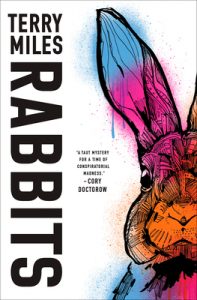 Escape Rating B: I honestly did not expect to like The Quiet Room. The first book in the series, titled
Escape Rating B: I honestly did not expect to like The Quiet Room. The first book in the series, titled 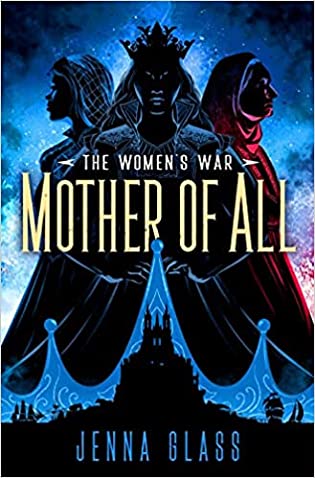 Mother of All (Women's War, #3) by
Mother of All (Women's War, #3) by 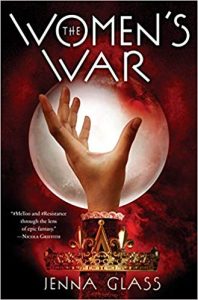 The story of Women’s War is a single story spread over three not insubstantial parts, meaning that it begins in the first book,
The story of Women’s War is a single story spread over three not insubstantial parts, meaning that it begins in the first book, 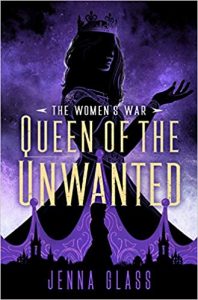 Escape Rating A: Short summary of the series – loved the first book, wasn’t all that thrilled with the second but it was necessary, loved the third book. This book. Mother of All brought this epic trilogy to an appropriately epic conclusion, and it made wading through all the setup and political positioning and maneuvering in the second book worth the wade. Also worth the wait of anticipating this conclusion.
Escape Rating A: Short summary of the series – loved the first book, wasn’t all that thrilled with the second but it was necessary, loved the third book. This book. Mother of All brought this epic trilogy to an appropriately epic conclusion, and it made wading through all the setup and political positioning and maneuvering in the second book worth the wade. Also worth the wait of anticipating this conclusion.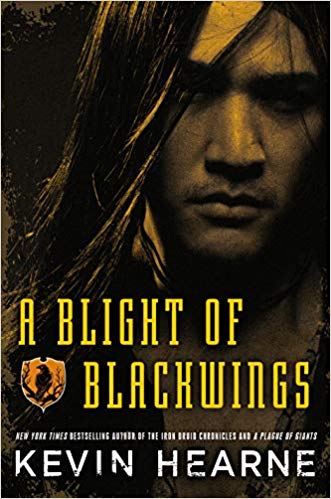 A Blight of Blackwings (Seven Kennings, #2) by
A Blight of Blackwings (Seven Kennings, #2) by 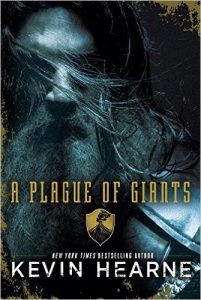 Just as in the first book in the series, the extremely awesome and utterly marvelous
Just as in the first book in the series, the extremely awesome and utterly marvelous 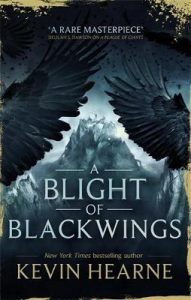
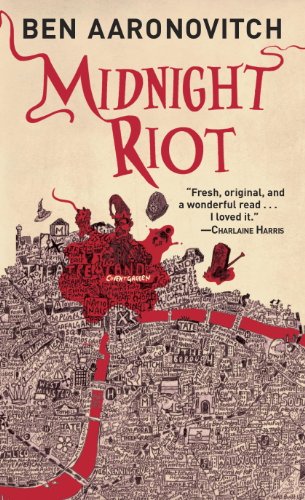 Midnight Riot (Peter Grant, #1) by
Midnight Riot (Peter Grant, #1) by 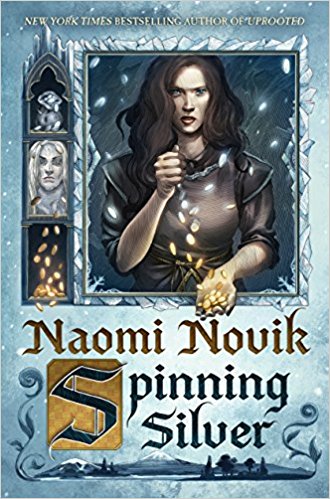 Spinning Silver by
Spinning Silver by 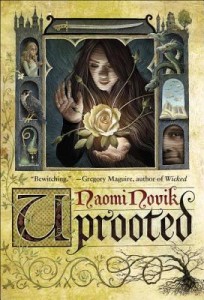 This is the story of Persephone at Night on Bald Mountain, with a bit of an assist from Rumpelstiltskin. In other words, Spinning Silver is another from the mind of Naomi Novik, a fitting follow up to the utterly marvelous
This is the story of Persephone at Night on Bald Mountain, with a bit of an assist from Rumpelstiltskin. In other words, Spinning Silver is another from the mind of Naomi Novik, a fitting follow up to the utterly marvelous